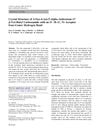 36 citations,
September 2018 in “Dermatologic Therapy”
36 citations,
September 2018 in “Dermatologic Therapy” Oral minoxidil helps hair growth, is cost-effective, and mostly well-tolerated.
 17 citations,
January 2011 in “The Korean Journal of Hepatology”
17 citations,
January 2011 in “The Korean Journal of Hepatology” Vogt-Koyanagi-Harada disease can develop during interferon therapy for chronic hepatitis C.
 15 citations,
January 2015 in “Pharmaceutical Biology”
15 citations,
January 2015 in “Pharmaceutical Biology” Chrysanthemum zawadskii extract may be a better treatment for hair loss than Minoxidil.
 15 citations,
April 2008 in “Steroids”
15 citations,
April 2008 in “Steroids” The more lipophilic the progesterone derivative, the better it binds to androgen receptors and has antiandrogenic effects.
 14 citations,
January 2006 in “Skinmed”
14 citations,
January 2006 in “Skinmed” A woman developed white patches on her skin and curly hair after hepatitis C treatment, likely due to the medication interferon alpha.
9 citations,
January 2022 in “Biology” Male mice are more susceptible to autism-like changes from valproic acid than female mice.
 6 citations,
October 2016 in “Journal of Chemotherapy”
6 citations,
October 2016 in “Journal of Chemotherapy” A man lost all his hair as a rare side effect after hepatitis C treatment.
 1 citations,
June 2022 in “JCRPE”
1 citations,
June 2022 in “JCRPE” Metreleptin treatment significantly improved metabolic health in a boy with congenital generalized lipodystrophy.
 12 citations,
July 2016 in “British journal of dermatology/British journal of dermatology, Supplement”
12 citations,
July 2016 in “British journal of dermatology/British journal of dermatology, Supplement” Different hair fiber development might explain why hair loss severity varies in patients with a specific genetic mutation, and treatments that thicken hair could help.
 2 citations,
December 2008 in “Journal of Chemical Crystallography”
2 citations,
December 2008 in “Journal of Chemical Crystallography” The research shows that hydrogen bonds greatly affect the crystal structure of a Finasteride derivative.
 December 2023 in “Natural product research”
December 2023 in “Natural product research” Lignans from Urtica triangularis may help treat benign prostatic hyperplasia (BPH).
 February 2023 in “Journal of dermatology”
February 2023 in “Journal of dermatology” The first Japanese case of a genetic hair disorder caused by specific mutations in the LIPH gene was identified.
October 2021 in “Gender & history” Baldness challenged men's self-image and masculinity in Britain from the late 19th to early 20th centuries, leading to a market for hair loss treatments.
June 2020 in “Comparative medicine” NSG mice had the most mites, and genetic factors affect immune response and susceptibility.
Drumstick leaves extract with amla powder significantly improved anemia in adolescent girls.
 2 citations,
January 2008 in “Journal of The American Academy of Dermatology”
2 citations,
January 2008 in “Journal of The American Academy of Dermatology” Trichoscopy is a helpful and quick method to diagnose hair loss without shaving.
9 citations,
May 2019 in “Medicine” The C-allele and CC-genotype in the PTPN22 gene lower the risk of alopecia areata.
7 citations,
March 2022 in “International Journal of Molecular Sciences” FGF21 can help reduce skin inflammation caused by C. acnes.
5 citations,
September 2021 in “Journal of cosmetic dermatology” People with alopecia areata often have abnormal thyroid hormones, thyroid antibodies, antinuclear antibodies, low vitamin D, and high C-reactive protein levels.
 1 citations,
September 2017
1 citations,
September 2017 C-scores can help predict gain-of-function and loss-of-function mutations.
 February 2010 in “Journal of The American Academy of Dermatology”
February 2010 in “Journal of The American Academy of Dermatology” Babies born after 38 weeks to mothers under 36 years old and not delivered by C-section have a higher risk of neonatal occipital alopecia.
 November 2008 in “Medical & surgical dermatology”
November 2008 in “Medical & surgical dermatology” A device was made in 2008 to measure hair loss severity. Other findings include: frizzy mutation in mice isn't related to Fgfr2, C/EBPx marks preadipocytes, Cyclosporin A speeds up hair growth in mice, blocking plasmin and metalloproteinases hinders healing, hyperbaric oxygen helps ischemic wound healing, amniotic membranes heal wounds better than polyurethane foam, rhVEGF165 from a fibrin matrix improves tissue flap viability and induces VEGF-R2 expression, and bFGF enhances wound healing and reduces scarring in rabbits.
 108 citations,
October 2004 in “Anesthesiology”
108 citations,
October 2004 in “Anesthesiology” Preoperative pain assessment, regional anesthesia, and vitamin C can help prevent CRPS after surgery.
87 citations,
April 1973 in “Endocrinology” The chemicals 17βC and its methyl ester can block the effects of testosterone on hamster skin but not the effects of DHT.
 38 citations,
March 2010 in “Medicine”
38 citations,
March 2010 in “Medicine” Most patients with Porphyria Cutanea Tarda had skin blisters and were often affected by hepatitis C and alcohol abuse, with differences between familial and sporadic cases.
34 citations,
June 2009 in “British journal of dermatology/British journal of dermatology, Supplement” Vitamin C derivative helps hair grow longer by making cells produce a growth factor through a specific cellular pathway.
![Benzo[c]quinolizin-3-ones: A Novel Class of Potent and Selective Nonsteroidal Inhibitors of Human Steroid 5α-Reductase 1](/images/research/ff6e6cbe-cb9c-4d11-87ef-671d28ffd4fa/small/15506.jpg) 28 citations,
September 2000 in “Journal of Medicinal Chemistry”
28 citations,
September 2000 in “Journal of Medicinal Chemistry” Benzo[c]quinolizin-3-ones are effective nonsteroidal inhibitors of human steroid 5α-reductase 1.
 22 citations,
April 2006 in “Journal of Dermatological Science”
22 citations,
April 2006 in “Journal of Dermatological Science” Vitamin C derivative increases versican in cells, potentially aiding hair growth.
 16 citations,
November 2020 in “PLOS ONE”
16 citations,
November 2020 in “PLOS ONE” Your lifestyle and health can affect your chances of getting COVID-19; not enough sleep, lots of exercise, and hair loss can increase risk, while washing hands, eating fruit daily, and taking vitamins A and C can lower it.


















![Benzo[c]quinolizin-3-ones: A Novel Class of Potent and Selective Nonsteroidal Inhibitors of Human Steroid 5α-Reductase 1](/images/research/ff6e6cbe-cb9c-4d11-87ef-671d28ffd4fa/small/15506.jpg)

